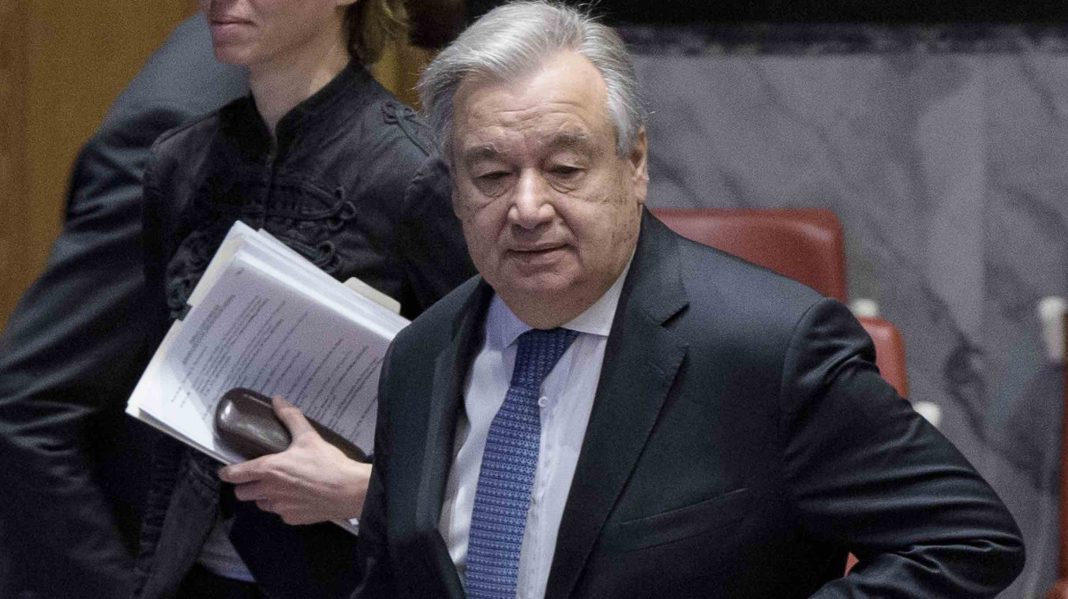By Janet Ekstract
LONDON (TURKISH JOURNAL) – In a press briefing on the G7 Summit, UN Secretary-General Antonio Guterres highlighted two top priorities: equitable vaccine distribution and combating climate change with organized climate action. The secretary-general pointed out that vaccines must be viewed as “global public goods” while also being made affordable and available for everyone. He reiterated that it’s “not only a matter of fairness and justice but it’s also a question of efficiency.” Guterres emphasized that everyone should get vaccinated in as short a time as possible. He said: “Unfortunately, now it has been very unequal and very unfair, the way vaccination is taking place in the world.” He referred to a USD $50 billion program to support vaccinations in developing countries that includes the International Monetary Fund (IMF), The World Bank, The World Health Organization (WHO) and the World Trade Organization (WTO). Guterres also mentioned announcements by the U.S. and the UK of millions of vaccines becoming available to developing countries very soon.
Guterres commented: “To defeat the virus, and to be able to boost our weapons against the virus – and the most important of those weapons is vaccination – to boost those weapons we need to act with the logic, with the sense of urgency, and with the priorities of a war economy. And we are still far from getting there.” He said that UK Prime Minister Boris Johnson announced he expects the G7 could reach one billion vaccine doses through commitments from different countries. Guterres said he wants to see a “global vaccination plan” and that his proposal includes those countries producing vaccines to work as a team in an “emergency task force” supported by WHO, by GAVI (vaccine alliance) and by international financial institutions as well as the pharmaceutical industry to define such a plan and implement it. He added it would mean doubling production capacity on vaccines globally and “creating mechanisms for equitable distribution of COVAX.”
Meanwhile, on the second priority – climate action, Guterres stressed the G7 countries play a critical role in ensuring that the world’s average temperature gets lowered. He said: “So, to a certain extent, we are on the verge of the abyss.” To that end, he outlined three “fundamental priorities” that need to be facilitated: creating a global coalition for net zero emissions of greenhouse gases by the mid-21st century, renewed importance in building resilience in communities, societies and finance. Guterres reiterated that finance is the key factor in supporting developing countries to achieve their climate action targets while combating challenges they face now with the current impacts of climate change. All G7 countries committed to net zero emissions in 2050 with G20 countries having presented their set of “nationally determined contributions” that Guterres commented shows “a very strong will to drastically reduce emissions in the next decade until 2030.” He added that if countries remain on track that these goals can be achieved. But Guterres stressed that to make this happen, G7 countries need to “clarify how this USD$100 billion will materialize. In 2020, it did not happen. It must happen in 2021 and onwards, and this is a very important element to make sure that we have a successful COP 26 and we need to mobilize the entire world without excuses and without pretexts for true net zero coalition before the middle of the century.”
A crucial factor in achieving climate action, Guterres emphasized is “to increase the support to adaptation, to the resilience of populations and societies.” Currently, he explained that adaptation support in climate finance is only about 21 percent of climate finance and that the overall proposal is to reach 50 percent by 2024. The secretary-general said it’s crucial for developed countries to be aware of all negative impacts that the developing world faces such as drought, storms, infectious diseases, insect infestations and other types of issues. He highlighted the suffering in the developing world and developed countries need to make a strong commitment to assisting with this. This is in order to ensure that the “response to the requirements in the developing world are in line with the commitments made in the Paris Agreement and a stronger emphasis on adaptation are three priorities in which I would like to see the G7 countries fully committed.” Guterres added that he feels “hopeful” the G7 meeting produces “new and important decisions” going forward and that this is “absolutely essential to guarantee that in the COP 26 in Glasglow” because as he pointed out, “in many aspects, it is the last opportunity.” Guterres said the UN will be working closely with the British government to ensure that in adaptation, mitigation and in finance, ambition is demonstrated in making the COP 26 a success.




